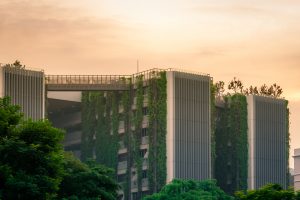Singapore as a long-term case study for tropical urban ecosystem services
April 19, 2021

The 51st anniversary of Earth Day will be observed on 22 April 2021. Originating from the modern environmental movement in 1970, it raises awareness for environmental protection and care for the planet. Sustainability and environmental protection have been at the forefront of Singapore’s development. The city-state has maintained a conscious effort to incorporate greenery into urban planning.
Singapore’s Garden City vision in the 1960s marked the formal incorporation of urban ecosystem services into national planning. Public policies integrated the benefits of natural environments together with the urban landscape. In ‘Singapore as a long-term case study for tropical urban ecosystem services’ (Urban Ecosystems, 2017), Associate Professor Dan Friess (NUS Department of Geography) charts out Singapore’s leading role in incorporating multiple ecosystem services into planning frameworks and supplements the literature through its tropical example.
A/P Friess provides a broad overview of Singapore’s historical management of the environment. Singapore’s top-down control of land use planning was critical to mitigate its lack of domestic food and water supplies. Ecosystem services such as Singapore’s ‘4 national taps strategy’ and nutrient cycling to boost food production were some strategies employed to provide Singapore with essentials. Regulations over ecosystems were also pertinent in Singapore’s development. For instance, Singapore focused on carbon sequestration and storage by preserving swaths of vegetation insofar as integrating greenery into urban architectures. It is through state management of the environment that Singapore was able to achieve modern developmental in tandem with environmental sustainability.
A/P Friess then turns to global and local scales. He examines how the strengths of Singapore’s urban ecosystem service knowledge have not only been adopted by small and medium-sized enterprises, but also exported to global superpowers such as China.
These historic urban ecosystem services are argued to be continually incorporated into public policy in the future. A/P Friess concludes with a call for Singapore to leverage on its global influence in integrating urban ecosystem services to benefit the region. Greater sharing of information will proffer insights as to how other countries can develop more sustainable policies and practices.
Read the article here.
